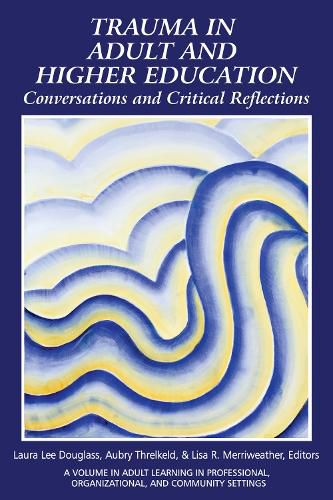Readings Newsletter
Become a Readings Member to make your shopping experience even easier.
Sign in or sign up for free!
You’re not far away from qualifying for FREE standard shipping within Australia
You’ve qualified for FREE standard shipping within Australia
The cart is loading…






This title is printed to order. This book may have been self-published. If so, we cannot guarantee the quality of the content. In the main most books will have gone through the editing process however some may not. We therefore suggest that you be aware of this before ordering this book. If in doubt check either the author or publisher’s details as we are unable to accept any returns unless they are faulty. Please contact us if you have any questions.
Trauma in Adult and Higher Education: Conversations and Critical Reflections invites readers to think deeply about the experiences of trauma they witness in and outside of the classroom, because trauma alters adult learners’ experience by disrupting identity, and interfering with memory, relationships and creativity. Through essays, narratives, and cultural critiques, the reader is invited to rethink education as more than upskilling and content mastery; education is a space where dialogue has the potential to unlock an individual’s sense of power and self-mastery that enables them to make sense of violence, tragedy and trauma.
Trauma in Adult and Higher Education: Conversations and Critical Reflections reveals the lived experiences of educators struggling to integrate those who have experienced trauma into their classrooms - whether this is in prison, a yoga class, or higher education. As discourses and programming to support diversity intensifies, it is central that educators acknowledge and respond to the realities of the students before them. Advocates of traumasensitive curriculum acknowledge that trauma shows up as a result of the disproportionate amount of violence and persistent insecurity that specific groups face. Race, gender, sexual orientation, ability, and immigration are all factors that expose individuals to higher levels of potential trauma.
Trauma has changed the conversations about what education is, and how it should happen. These conversations are resulting in new approaches to teaching and learning that address the lived experiences of pain and trauma that our adult learners bring into the classroom, and the workforce. This collection includes a discussion of salient implications and practices for adult and higher education administrators and faculty who desire to create an environment that includes individuals who have experienced trauma, and perhaps prevents the cycle of violence.
$9.00 standard shipping within Australia
FREE standard shipping within Australia for orders over $100.00
Express & International shipping calculated at checkout
This title is printed to order. This book may have been self-published. If so, we cannot guarantee the quality of the content. In the main most books will have gone through the editing process however some may not. We therefore suggest that you be aware of this before ordering this book. If in doubt check either the author or publisher’s details as we are unable to accept any returns unless they are faulty. Please contact us if you have any questions.
Trauma in Adult and Higher Education: Conversations and Critical Reflections invites readers to think deeply about the experiences of trauma they witness in and outside of the classroom, because trauma alters adult learners’ experience by disrupting identity, and interfering with memory, relationships and creativity. Through essays, narratives, and cultural critiques, the reader is invited to rethink education as more than upskilling and content mastery; education is a space where dialogue has the potential to unlock an individual’s sense of power and self-mastery that enables them to make sense of violence, tragedy and trauma.
Trauma in Adult and Higher Education: Conversations and Critical Reflections reveals the lived experiences of educators struggling to integrate those who have experienced trauma into their classrooms - whether this is in prison, a yoga class, or higher education. As discourses and programming to support diversity intensifies, it is central that educators acknowledge and respond to the realities of the students before them. Advocates of traumasensitive curriculum acknowledge that trauma shows up as a result of the disproportionate amount of violence and persistent insecurity that specific groups face. Race, gender, sexual orientation, ability, and immigration are all factors that expose individuals to higher levels of potential trauma.
Trauma has changed the conversations about what education is, and how it should happen. These conversations are resulting in new approaches to teaching and learning that address the lived experiences of pain and trauma that our adult learners bring into the classroom, and the workforce. This collection includes a discussion of salient implications and practices for adult and higher education administrators and faculty who desire to create an environment that includes individuals who have experienced trauma, and perhaps prevents the cycle of violence.